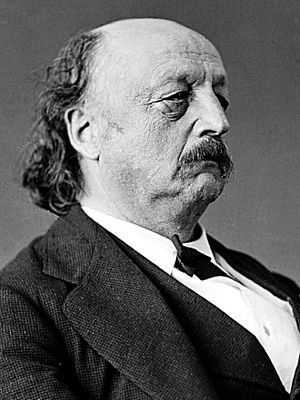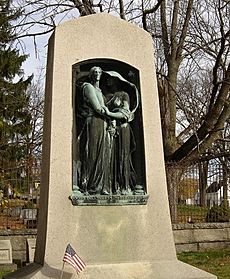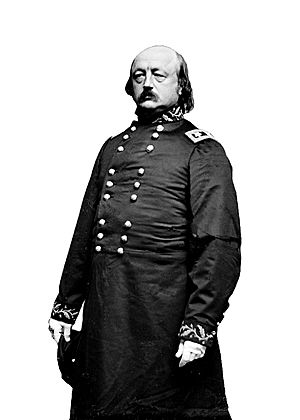Benjamin Butler facts for kids
Quick facts for kids
Benjamin Butler
|
|
|---|---|
 |
|
| 33rd Governor of Massachusetts | |
| In office January 4, 1883 – January 3, 1884 |
|
| Lieutenant | Oliver Ames |
| Preceded by | John Long |
| Succeeded by | George D. Robinson |
| Member of the U.S. House of Representatives from Massachusetts |
|
| In office March 4, 1877 – March 4, 1879 |
|
| Preceded by | John K. Tarbox |
| Succeeded by | William A. Russell |
| Constituency | 7th district |
| In office March 4, 1867 – March 4, 1875 |
|
| Preceded by | John B. Alley |
| Succeeded by | Charles Perkins Thompson |
| Constituency | 6th district (1867–1873) 7th district (1873–1875) |
| Member of the Massachusetts Senate |
|
| In office 1859 |
|
| Preceded by | Arthur Bonney |
| Succeeded by | Ephraim Patch |
| Personal details | |
| Born |
Benjamin Franklin Butler
November 5, 1818 Deerfield, New Hampshire, U.S. |
| Died | January 11, 1893 (aged 74) Washington, D.C., U.S. |
| Resting place | Hildreth Cemetery |
| Political party |
|
| Other political affiliations |
Greenback (1874–1889) |
| Spouse |
Sarah Hildreth
(m. 1844; died 1876) |
| Children | 4, including Blanche |
| Education | Colby College (BA) |
| Signature | |
| Military service | |
| Allegiance | |
| Branch/service | |
| Rank | |
| Commands | |
| Battles/wars | |
Benjamin Franklin Butler (born November 5, 1818 – died January 11, 1893) was an important American figure. He was a major general in the Union Army during the American Civil War. He was also a politician, a lawyer, and a businessman from Massachusetts.
Butler is most remembered for his role as a general during the Civil War. He also played a big part in the effort to remove U.S. President Andrew Johnson from office. Butler was a well-known and often talked-about person in American politics. He served five times in the U.S. House of Representatives. He also ran for governor many times before finally winning in 1882.
Contents
Early Life and Education
Benjamin Franklin Butler was born in Deerfield, New Hampshire. He was the youngest of six children. His father, John Butler, fought in the War of 1812. He died when Benjamin was very young. Benjamin was named after the famous Founding Father, Benjamin Franklin. His older brother, Andrew Jackson Butler, also served in the Union Army during the Civil War.
Benjamin's mother was a very religious woman. She wanted him to become a minister. In 1827, when he was nine, Butler received a scholarship to Phillips Exeter Academy. He was known as a "reckless" and "headstrong" boy who often got into fights.
In 1828, his family moved to Lowell, Massachusetts. His mother ran a boarding house for people who worked in the textile mills. Butler went to public schools there. He was almost kicked out for fighting. His principal said he was a boy who "might be led, but could not be driven."
He went to Waterville College (now Colby College) to study for the ministry, as his mother wished. However, he decided it wasn't for him. In 1836, he wanted to go to West Point for military training, but he couldn't get a spot. He continued his studies at Waterville. There, he became better at arguing and speaking. He also started to support the Democratic Party. He graduated in 1838.
After college, Butler returned to Lowell. He worked as an apprentice for a local lawyer to learn about law. He became a lawyer in Massachusetts in 1840 and started his own law practice in Lowell.
Early Career as a Lawyer
Butler quickly became known as a very determined lawyer, especially for criminal cases. He was so good at trials that newspapers often wrote about his work. This success allowed him to open a law office in Boston as well.
Political and Military Career
Benjamin Butler served in the Massachusetts legislature. He was a Democrat who was against the war. He was also an officer in the state's military. When the Civil War began, he joined the Union Army.
He became well-known for his command of New Orleans during the war. He made some controversial decisions there. One famous order was called Butler's General Order No. 28. It said that any woman who insulted a Union soldier would be treated like a "woman of the town." This order caused a lot of anger in the South and in other countries like England and France.
Butler was sometimes called "Beast Butler" or "Spoons Butler." The "Spoons Butler" nickname came from an event where he took a set of silver from a woman in New Orleans. Even though the woman was not supposed to carry the silver, many people saw it as him taking personal items. This made some people believe he used his power to take things from people in New Orleans.
After some military setbacks, Butler was removed from the Union Army. However, he soon won an election to the United States House of Representatives from Massachusetts. He believed that President Johnson's plans for rebuilding the country after the war were too weak. He wanted harsher punishments for former Confederate leaders and stronger rights for all citizens.
Butler was one of the first people to suggest that President Johnson should be removed from office. When Johnson was impeached in 1868, Butler was the main prosecutor for the House of Representatives during the trial. He also helped write important laws like the Ku Klux Klan Act of 1871 and the Civil Rights Act of 1875.
In 1873, Butler built a large house, known as the Butler Building, across from the United States Capitol in Washington, D.C. Part of the building was made to be fireproof. It was used to store important maps and records. President Chester A. Arthur even used the building while the White House was being renovated. Later, the U.S. government bought the building.
Butler tried four times to become governor of Massachusetts between 1871 and 1879, but he didn't win. He finally became governor in 1882. As governor, Butler worked to improve how the state government was run. He also supported many reforms.
He ran for governor again in 1883, but he lost by a small number of votes. In his later years, Butler worked on his memoir, called Butler's Book, which was published in 1892.
Personal Life
On May 16, 1844, Benjamin Butler married Sarah Hildreth. She was a stage actress. They had four children together: Paul (who died young), Blanche, another son named Paul, and Ben-Israel.
Death

Benjamin Butler died on January 11, 1893. He passed away due to problems from a lung infection. He is buried in his wife's family cemetery in Lowell, Massachusetts.
Butlerism: His Political Ideas
"Butlerism" was a term used to describe Benjamin Butler's political beliefs and goals. These ideas included:
- Supporting women's suffrage, which means giving women the right to vote.
- Supporting Irish nationalism, which was about Irish independence.
- Wanting an eight-hour workday for laborers.
- Believing in using paper money called greenbacks to pay off the national debt.
Interesting Facts About Benjamin Butler
- Butler is said to have started the tradition of the "lone walk." This is a special ceremony when a Governor of Massachusetts finishes their term.
- As governor, Butler appointed the first Irish-American and African-American judges in Massachusetts. He also appointed the first woman to a high executive office, Clara Barton.
- Butler helped fund a scholarship for African-American students at Phillips Andover Academy.
- Harvard University usually gave honorary degrees to Massachusetts governors. However, they did not give one to Butler.
- When he died, Butler was very wealthy.
- The words on Butler's monument say, "the true touchstone of civil liberty is not that all men are equal but that every man has the right to be the equal of every other man—if he can."
- Some of Butler's descendants include famous people like scientist Adelbert Ames, Jr. and writer George Plimpton.
Images for kids
-
Engraving showing the Baltimore riot of 1861
-
Map of Fort Monroe, 1862
-
Drawing of military movements in the Battle of Big Bethel
-
A cartoon from 1874 by Thomas Nast
See also
 In Spanish: Benjamin Franklin Butler para niños
In Spanish: Benjamin Franklin Butler para niños
- List of American Civil War generals (Union)
- List of Massachusetts generals in the American Civil War
- Massachusetts in the American Civil War
- General Butler (ship)
- New Hampshire Historical Marker No. 145: Deerfield Parade
- Butler House (Pueblo, Colorado)







